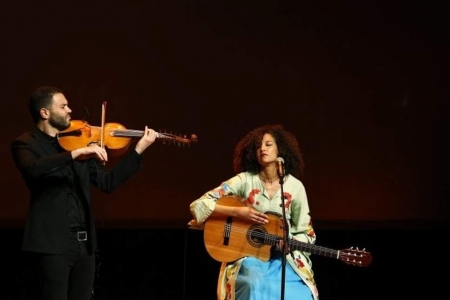Aga Khan Music Awards, Gulbenkian Foundation, Lisbon review: Impeccably organised and presented
The awards draw on the inspirational work of the Aga Khan Music Initiative, which was originally created to revive the traditional musics of Central Asia
We all know that music is political, but in Lisbon this week it’s asserting that truth in a uniquely benign way, thanks to a visionary scheme headed by the Aga Khan. Simultaneously accepting Portuguese citizenship – thus making a significant political point – this quietly charismatic leader of the world-wide Ismaili community is also launching a biennial series of music awards. Impeccably organised and presented, they are bringing a much-needed injection of integrity to the commercially contaminated realm of “world-music”.
They are open to all musicians from countries with a significant Muslim population, but no religious groups are excluded. As the Aga Khan rightly observes, a propos the musical prohibition often claimed to exist in the Qur’an: “’Muslim’ and ‘music’ are words not often associated together in the public mind, but they should be.”
The awards draw on the inspirational work of the Aga Khan Music Initiative, which was originally created to revive the traditional musics of Central Asia, but which now covers a huge swathe of the globe stretching from Mali and Morocco to Xinjiang and Indonesia. While the top award is for performing excellence, subsidiary awards are made for categories of no less importance, from composition and education to social inclusion and the revitalisation of dying traditions. As Ara Guzelimian, provost of the Juilliard School in New York – and a member of the jury –nicely puts it: “I now simply feel better about the world, and if that’s a gift that the awards give us, then there can be no better gift.”
The inaugural winner of the performance award turns out to be a remarkable young Egyptian named Mustafa Said. Blind from birth, he’s carved out a distinguished career as a teacher and song-collector as well as a singer self-accompanied on the oud. His voice may not be conventionally “beautiful”, but it has a clarity and expressiveness that speaks directly to the heart.
But in the course of nine hours of competitive music-making, other finalists – from Palestine, Iran, Turkey, and the Central Asian ‘Stans’ – prove no less remarkable. The Turkish oud player Burak Kaynarca, whose multifarious other activities include directing choirs, chamber groups and musicological research, lets us savour the full range of his instrument’s palette with a series of compelling improvisations. The singer and sarangi player Asin Khan Langa, from a remote village in Rajasthan, could have charmed the birds off the trees with his entertaining Sufi songs, while the Palestinian oud player Ahmad Al Khatib brings a whiff of both English lute-playing and Segovia to his elegant improvisations.
Nasim Siabishahrivar’s melismatic singing captures the essence of the Persian classical style, while two instrumentalists use the generous length of their time-slots to take us on fascinating musical journeys. No praise is too high for Shahou Andalibi’s lovely interweaving of song into his performance on the neyflute, nor for Reza Parvizade’s spellbinding monologue on the kamancheh spike-fiddle. Those wanting to listen to these events can find them on the AKDN YouTube channel.
- 3379 reads
 Ismaili.NET - Heritage F.I.E.L.D.
Ismaili.NET - Heritage F.I.E.L.D.